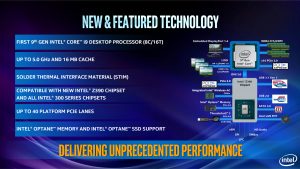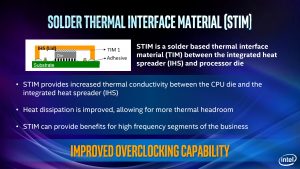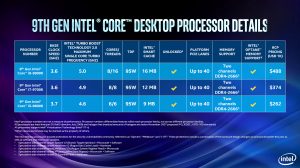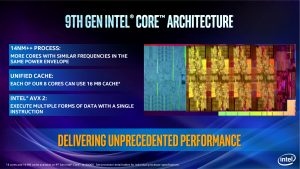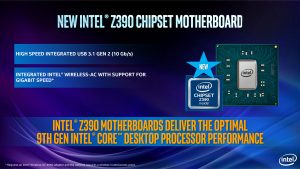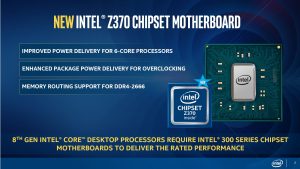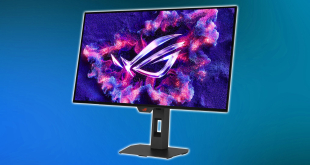Intel has launched three CPUs from its 9th Generation that are all unlocked K SKUs with more models sure to follow in time. The microarchitecture inside Core i9-9900K appears to be little changed from 6th Gen Skylake (Intel has given no details, so we cannot be sure) and while we quibble in our video about calling the new CPUs 9th Gen, it does in fact make a certain amount of sense as Intel has torn up its own rule book.
| Model code | Cores/Threads | Base Speed | Max. Turbo | TDP | Cache | UK Price |
| Core i9-9900K | 8/16 | 3.6GHz | 5.0GHz | 95W | 16MB | £600 |
| Core i7-9700K | 8/8 | 3.6GHz | 4.9GHz | 95W | 12MB | £500 |
| Core i5-9600K | 6/6 | 3.7GHz | 4.6GHz | 95W | 9MB | £350 |
| Core i7-8700K | 6/12 | 3.7GHz | 4.7GHz | 95W | 12MB | £450 |
| Core i5-8600K | 6/6 | 3.6GHz | 4.3GHz | 95W | 9MB | £300 |
The new Core i9-9900K has eight cores with Hyper Threading, while Core i7-9700K and Core i5-9600K have eight and six cores respectively and do not use HT. Intel introduced HT back in 2002 as part of Pentium 4, long before the first Core CPUs were launched in 2008. And now it seems that HT is vanishing from the desktop, without a word of explanation.
This means that Core i9-9900K looks like a bigger, better version of Core i7-8700K as it has extra cores and extra clock speed. Core i5-9600K sounds like it will be a faster version of Core i5-8600K with a slightly higher price, however Core i7-9700K is a new type of CPU as Intel has not previously produced an eight core CPU with eight threads.
Core i9-9900K uses the same 14nm++ fabrication process as Coffee Lake and while the name Coffee Lake Refresh has only been used as shorthand, it appears these 9th Gen CPUs bring nothing new to the party. It seems fair to say that Intel has taken the building blocks used inside Skylake, Kaby Lake and Coffee Lake and has simply tacked another pair of CPU cores onto the guts of Coffee Lake. Intel hasn’t given details of the transistor count or die area in recent generations of CPU, however so many Coffee Lakes have been delidded that we can clearly see there is plenty of room to increase the size of the silicon die.
The reason so many people delidded recent generations of Intel CPU was the inexplicable use of TIM (Thermal Interface Material) that acted as a thermal barrier and led to unnecessarily high temperatures in these enthusiast CPUs. One of the major announcements for 9th Gen, including Core i9-9900K, was the welcome return of the soldered heat spreader. Intel has come up with the term STIM or Soldered TIM, to describe this process which is a neat move as it suggests that a conventional engineering process is an Intel technology.
Say hello to the Z390 chipset
Both Z390 and Z370 chipsets support a total of 14 USB ports with a maximum of 10x USB 3.1 Gen1 ports, however Z370 does not natively support USB 3.1 Gen2. The new Z390 adds support for a maximum 6x USB 3.1 Gen2 ports, along with integrated 802.11ac Wi-Fi.
Intel 9th Gen and 8th Gen CPUs will run on any 300 series chipset so you do not require a Z390 motherboard to run a Core i9-9900K, although it is safe to say you will need to install the latest BIOS on your motherboard. We successfully swapped Core i9-9900K and Core i7-8700K between Gigabyte Z390 Aorus Master and ASRock Z370 Extreme4. Having said that, the Auto voltage setting for the Core i9 on the ASRock Z370 was enormous at 1.512V which is clearly a sign that BIOS support will need to be tweaked for existing motherboards as the new CPUs hit the market.
 KitGuru KitGuru.net – Tech News | Hardware News | Hardware Reviews | IOS | Mobile | Gaming | Graphics Cards
KitGuru KitGuru.net – Tech News | Hardware News | Hardware Reviews | IOS | Mobile | Gaming | Graphics Cards


